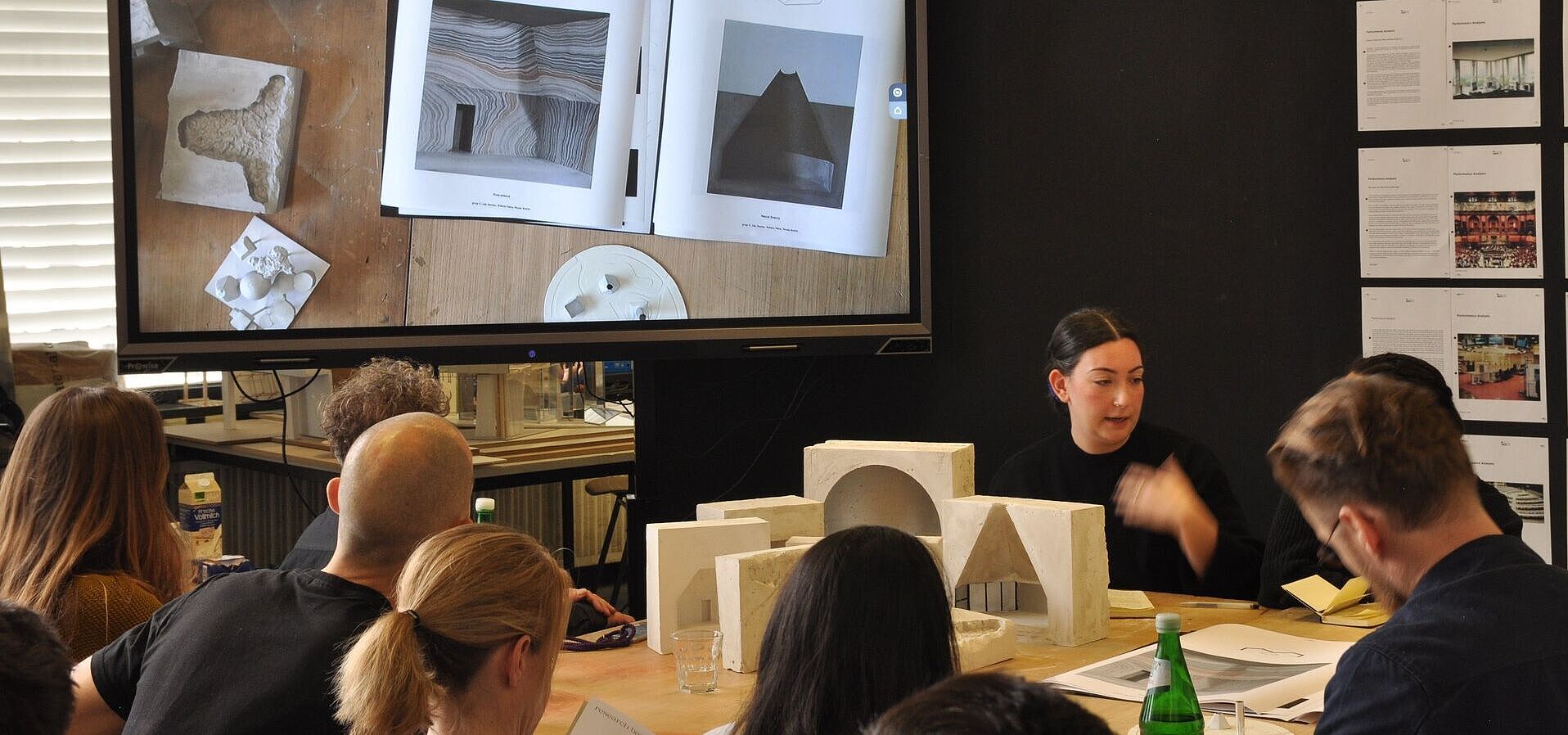 © Rainer Hehl
© Rainer Hehl
Architecture Typology, M.Sc.
Program overview
Architectural and urban development tasks are always confronted with political, cultural, technical, economic, social, and ecological changes. In the international, English-language master's program in Architecture Typology, you learn to bring together very different and sometimes conflicting requirements and objectives in the design process to create a holistic architectonic solution. The program also focuses closely on building typology. In order to confront current challenges, building typologies are rethought and tools developed that enable nuanced responses to complex questions in the respective context. This is done using established typological methods of analysis and design as well as new, experimental, digital, and speculative practices of creating types.
| Degree | Master of Science |
|---|---|
| Standard period of study | 4 semesters |
| Credit points | 120 |
| Program start | Winter semester |
| Admission | Restricted admission |
| Language of instruction | English |
Admission requirements
The formal admission requirement for the consecutive master’s program in Architecture Typology is a first university degree in architecture qualifying the applicant for professional work.
As the master’s program is taught in English, applicants must submit proof of English skills at CEFR (Common European Framework of Reference for Languages) level C1. Knowledge of German is useful as some courses/modules are offered in German. However, this is not a condition for admission to studies.
You can find more information about the application, admission, and selection procedures in the application and admission regulations of the degree program (see the link "Study and examination regulations").
Program structure
The master’s program is divided into compulsory, compulsory elective, and elective components. The compulsory component totals 84 credit points, which include three large design projects and the master’s thesis. Students must also complete a total of 24 credit points in the compulsory elective component, choosing from a set list of modules. The elective component encompasses 12 credit points.
The objectives and further structure of the program as well as the examination requirements and details on how the examinations are carried out are set down in the study and examination regulations.
There is a proposed course schedule for the degree program. This is a recommendation for how to complete the degree program within the standard period of study of four semesters. You can find it as an annex to the study and examination regulations.
Study and examination regulations:
Content and modules
The master’s degree program in Architecture Typology consists of modules which combine curriculum content on a specific topic and often include various study and teaching formats such as lectures, practical tutorials, seminars, and practical projects. Students are required to earn a specific number of credit points and complete certain coursework and assessments in each module.
A current overview of all modules is available in TU Berlin’s module transfer system (MTS). The MTS also provides an overview of which modules are mandatory for your degree program and which are elective. Detailed module descriptions provide information about the content, learning objectives, participation requirements, workload, type of assessment, and much more.
The module catalogue is based on the study and exam regulations. The most current version of the regulations applies to new applicants.
To module databaseInternships
Before starting the program, one or more internships totaling at least 640 hours (typically in 16 weeks) must have been completed. Professional work that you did before and during a previous university degree program can be counted towards this. At the latest when registering the master’s thesis, proof of these internships must be submitted.
All further details relating to internships can be found in the internship guidelines.
Stays abroad
You can generally complete parts of the program abroad, either in the form of study abroad or internships. General information concerning stays abroad is available from the TU Berlin International Office (studying abroad) or the Career Service (internships abroad).
Acquired skills
As a graduate of the master's degree program in Architecture Typology, you will have sophisticated skills in designing and constructing and will be able to develop and coordinate complex planning processes in an interdisciplinary and integrative manner. In particular, you will be able to recognize particular conditions and potentials among the many different future design tasks and be able to implement these into innovative designs. After completing the program, you will be able to develop new types that interact with social and technological changes, and you will contribute to strengthening architecture as a cultural discipline. You will also be able to integrate sustainability aspects in urban planning, architectonic, technical, social, historical, and ecological contexts.
After your studies
After the master's degree program in Architecture Typology, the focus of your work is on planning design, construction, and types. Following your degree, you will need to work professionally for at least two years before you may be entered into a German federal state’s list of registered architects.
As an architect, you can be hired to work in architectural offices or work as a freelancer. In addition, you can work in public service, for example with the building authorities or in construction companies and housing associations.
Further information & downloads
Questions about the degree program: Course Guidance
Recognition of previously acquired credits: Examination Board
Subject-specific Counseling and Services
Office of Academic and Student Affairs of the Faculty
Guidance and choosing the right degree program: Academic Advising Service
Application and enrollment: Office of Student Affairs
